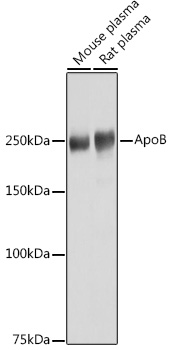![Sandwich ELISA analysis of human apoB protein using GTX02901 Apolipoprotein B antibody [LDL20 + LDL17] as coating antibody and GTX02900-02 Apolipoprotein B antibody [LDL11] (Biotin) as detecting antibody. Sandwich ELISA analysis of human apoB protein using GTX02901 Apolipoprotein B antibody [LDL20 + LDL17] as coating antibody and GTX02900-02 Apolipoprotein B antibody [LDL11] (Biotin) as detecting antibody.](https://www.genetex.com/upload/website/prouct_img/normal/GTX02900-02/GTX02900-02_20210507_ELISA_w_23053123_459.webp)
Sandwich ELISA analysis of human apoB protein using GTX02901 Apolipoprotein B antibody [LDL20 + LDL17] as coating antibody and GTX02900-02 Apolipoprotein B antibody [LDL11] (Biotin) as detecting antibody.
Apolipoprotein B antibody [LDL11] (Biotin)
GTX02900-02
ApplicationsWestern Blot, ELISA
Product group Antibodies
ReactivityHuman, Monkey
TargetAPOB
Overview
- SupplierGeneTex
- Product NameApolipoprotein B antibody [LDL11] (Biotin)
- Delivery Days Customer9
- Application Supplier Note*Optimal dilutions/concentrations should be determined by the researcher.Not tested in other applications.
- ApplicationsWestern Blot, ELISA
- CertificationResearch Use Only
- ClonalityMonoclonal
- Clone IDLDL 11
- Concentration1 mg/ml
- ConjugateBiotin
- Gene ID338
- Target nameAPOB
- Target descriptionapolipoprotein B
- Target synonymsFCHL2, FLDB, LDLCQ4, apoB-100, apoB-48, apolipoprotein B-100, apolipoprotein B (including Ag(x) antigen), apolipoprotein B48
- HostMouse
- IsotypeIgG1
- Protein IDP04114
- Protein NameApolipoprotein B-100
- Scientific DescriptionThis gene product is the main apolipoprotein of chylomicrons and low density lipoproteins. It occurs in plasma as two main isoforms, apoB-48 and apoB-100: the former is synthesized exclusively in the gut and the latter in the liver. The intestinal and the hepatic forms of apoB are encoded by a single gene from a single, very long mRNA. The two isoforms share a common N-terminal sequence. The shorter apoB-48 protein is produced after RNA editing of the apoB-100 transcript at residue 2180 (CAA->UAA), resulting in the creation of a stop codon, and early translation termination. Mutations in this gene or its regulatory region cause hypobetalipoproteinemia, normotriglyceridemic hypobetalipoproteinemia, and hypercholesterolemia due to ligand-defective apoB, diseases affecting plasma cholesterol and apoB levels. [provided by RefSeq, Jul 2008]
- ReactivityHuman, Monkey
- Storage Instruction-20°C or -80°C,2°C to 8°C
- UNSPSC41116161





